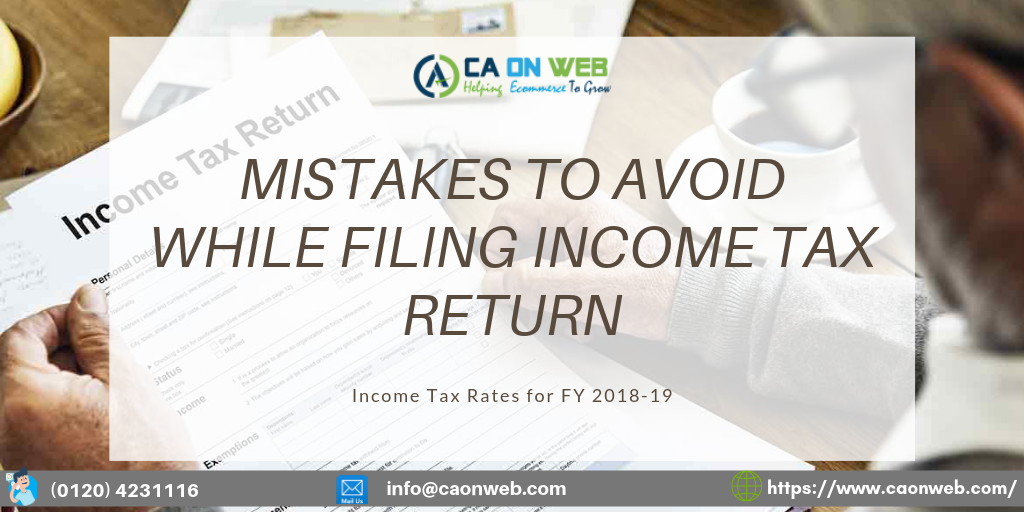Income Tax India e-filing:
Income Tax is a tax that the government imposes on income generated by businesses and individuals. And, an ITR is a form in which a taxpayer furnishes information about his total income and tax payable on that income to the IT Department.
In India, the ITR is filed online and the process of submitting your income tax return online is known as e-filing or electronic filing. For income tax return filing in India following steps to be followed:
Step 1: Register yourself on the IT Department’s online tax filing site (incometaxindiaefiling.gov.in).
Step 2: Choose how you want to e-file as there are two ways of e-filing your ITR. One is to go to the download section and select the required income tax return form, download it and fill all the details offline and then upload it back on the site. And, second is to fill the income tax return form online by selecting the quick e-file option.
Step 3: Select the required income tax return form.
Step 4: Keep all the documents ready: Keep your PAN, Form 16, interest statement, TDS certificates, details of investments, insurance and home loans handy.

Step 5: Fill the income tax return form and upload: If you choose to fill the form offline, then after you have downloaded the form and fill all the details, click on generate XML. Then go to the IT website and click on the upload XML button. You will have to first log in to upload the XML file and click on submit.
Step 6: Verify ITR V: The tax filing
process is incomplete and ITR is invalid unless your ITR V is verified. For verification
of ITR-V, you can electronically verify or mail the signed ITR V to the
processing center in Bengaluru within 120 days of filing the return.
Mistakes to avoid while filing ITR:
You should file your income tax return carefully because improper income tax return filing can bring troubles in the form of penalty & notices from the IT department. You can also, take help of top Chartered accountants in India for online income tax return filing by using online CA services to avoid any penalty & notices from the income tax department.
To make things easy for you, we are here explaining common mistakes to avoid while online income tax returns filing:
1) Selecting the incorrect form:
A taxpayer must file ITR using the correct form as if he file ITR using the incorrect form, the return will be considered as defective and he has to file a revised ITR using the correct form. If the defect is not rectified within the time limit, then it is considered the same as not filing a return at all.
2) Furnishing incorrect personal details:
A taxpayer must furnish correct personal details and make sure that in case of any refund bank particulars like account number, IFSC code, etc. are accurately mentioned in order to receive the refund on time and without hassles.
3) Not reporting all bank accounts:
A taxpayer is required to report all the bank accounts held by him in the income tax return. However, dormant accounts are excluded from the requirement of reporting in the ITR.
4) Not reporting interest incomes:
A taxpayer must report all the interest incomes received or accrued due to him in the previous financial year while filing his income tax return as they generally forget to report interest earned from the savings bank account, fixed deposits (FDs), recurring deposits (RDs), etc.
5) Not reporting income from the last job:
If a salaried taxpayer switched his job in a financial year, then the income from his previous job must be reported while filing an ITR with income from the current job.
6) Not reporting tax free incomes or exempt income:
A taxpayer must report all his incomes even if some is tax-free. These exempt incomes are to be reported in the ‘Exempt Income’ schedule of the ITR.
7) Not clubbing incomes:
A taxpayer must club income of specified persons to his own income and tax payable by him is calculated on the total of these two incomes. The income of the minor child is added to the income of his/her parent and parent can claim exemption of Rs.1500 or income of minor so clubbed, whichever is less.
8) Not Reconciling TDS with Form 26AS:
A taxpayer must check the details of all the income details, TDS deducted, advance tax paid, self-assessment tax paid, etc. in Form 26AS and also verify it with Form 16 and Form 16A to avoid any discrepancy.
9) Not Paying Advance Tax/ Self-Assessment Tax:
A taxpayer must ensure that the tax dues are cleared on or before 31st March of the financial year because failure to do so within due dates will attract interest and penalty.
10) Not Verifying ITR V on time:
After e-filing your ITR, a taxpayer must e-verify his return via Net banking, Aadhaar Card or through the EVC process. If due to any reason he is unable to e-verify your return, then he can sign and send the ITR-V to the CPC via ordinary or speed post only within 120 days from e-filing of return.
So, the above mentioned are the common mistakes to avoid while online income tax return filing. To understand in detail you can also consult top tax consultant in India and top Chartered accountants in India by using our online CA services through CAONWEB.

FAQS:
1) For whom Income Tax Return filing is compulsory?
In the following cases income tax return filing is compulsory:
Ø Any private, public, domestic or foreign company located and/or doing business in India whether having profit or loss or nil income.
Ø Any firm including LLP or Unlimited Liability Partnership.
Ø Any resident having any asset located outside of India (might include any financial interest in any entity as well) OR any resident who retains signing authority for an account which is based outside India whether or not having income chargeable to tax.
Ø Individuals, HUF, AOP or BOI and artificial juridical persons having total income (or the total income of any other person in respect of which he is assessable under income tax act) during the previous year exceeds the basic exemption limit before giving effect to the provisions of Chapter VI-A.
2) What is the due date of online income tax return filing for FY 2018-19?
The ITR due date is 30th September 2019 forCompany, a person other than a company whose accounts are required to be audited and a working partner of a firm whose accounts are required to be audited. And, the ITR due the date is 31st July 2019 forany another assessee.
3) What if a person furnishes the return of income after the ITR due date or does not furnish the return of income?
Where a person furnishes the return of income after the ITR due date or does not furnish the return of income than the simple interest of 1% per month or part of the month is payable. However, if he/she has paid taxes in full on or before the ITR due date interest is not levied.
Also, where a person fails to furnish a return of income within the prescribed time limit he shall pay, by way of fee, a sum of-
a) Rs.5000, if the return is furnished on or before the 31st December of the A.Y.
b) Rs.10000 in any other case
However, if the total income of the person does not exceed Rs.5 lakhs, the fees payable shall not exceed Rs.1000.
4) How I can file income tax return online?
You can do online income tax return filing either directly or you can also take help of professionals by visiting our website of CAONWEB. You have to follow these simple steps:
Ø Step 1: Go to CAONWEB site and choose professionals and required service and submit your details.
Ø Step 2: Our team will contact you and guide you about online income tax return filing and documents required for it.
Ø Step 3: Then you are required to submit the required information and documents.
Ø Step 4: We will process your documents and complete the filing process.
Ø Step 5: And your income tax return will be easily filed online.
5) What are the different types of Income Tax Return Forms available for Income Tax India e filing?
Income Tax Return Forms for Income Tax India e filing:
Ø ITR 1‐ Applicable to individuals being a resident (other than not ordinarily resident) having total income up to ₹ 50 lakh, having income from salaries, one house property, other sources ( interest, etc.), and agricultural income up to ₹ 5,000. [Not for an individual who is either director in a company or has invested in unlisted equity shares]
Ø ITR 2‐ Applicable for Individuals and HUFs not having income from profits and gains of business or profession
Ø ITR 3‐ Applicable for individuals and HUFs having income from profits and gains of business or profession
Ø ITR 4‐ Applicable for individuals, HUFs and firms (other than LLP) being a resident having total income up to ₹ 50 lakh and having presumptive income from business and profession. [Not for an individual who is either director in a company or has invested in unlisted equity shares]
Ø ITR 5‐ Applicable for persons other than Individual, HUF, Company and, Person filing Form ITR‐7
Ø ITR 6‐ Applicable for companies other than companies claiming an exemption under section 11
Ø ITR 7‐ Applicable for those persons including companies who are required to furnish return under sections 139(4A) or 139(4B) or 139(4C) or 139(4D) or 139(4E) or 139(4F)

Chartered Accountant by profession, CA Sakshi Agarwal has an experience of above11 years in Cross Border compliance , Import Export , International Taxation & is a passionate content creator.
